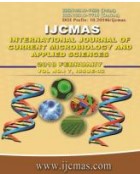


 National Academy of Agricultural Sciences (NAAS)
National Academy of Agricultural Sciences (NAAS)

|
PRINT ISSN : 2319-7692
Online ISSN : 2319-7706 Issues : 12 per year Publisher : Excellent Publishers Email : editorijcmas@gmail.com / submit@ijcmas.com Editor-in-chief: Dr.M.Prakash Index Copernicus ICV 2018: 95.39 NAAS RATING 2020: 5.38 |
Field experiments were conducted during Kharif season, 2013 and 2014 in red sandy clay loamy soil in farmer’s fields at Talaku village of Chitradurga district, Karnataka to assess the effect of organic farming practices on productivity, quality and economics of chilli hybrids in Central Dry Zone of Karnataka. The experiment consists of four organic nutrient sources (S) and three chilli hybrids (V) laid out in Factorial Randomized Complete Block Design (FRCBD) with three replications. The results revealed that significantly higher yield (2940 kg ha-1) and quality parameters viz., ascorbic acid (148.3 mg 100 g-1), capsaicin content (1.9%), total extractable colour (158.5ASTA units), oleoresin (13.4%), oleoresin yield (388 kg ha-1), lesser discolored fruits (2.3%) and yield of discolored fruits (67.7 kg ha-1) were associated with application of vermicompost, silkworm waste and goat manure (75 kg N equivalent ha-1 as basal dose at 1:1:1) + EBDLM (75 kg N equivalent ha-1 top dressing) + 3 sprays of panchagavya (3%) at 25, 50 and 75 DAT (S3) as compared to recommended chilli cultivation practices (137.5 mg 100 g-1, 1.5%, 142.2 ASTA units, 11.2%, 320.8 kg ha-1, 3.0, 86.6 kg ha-1, respectively) except yield (2935 kg ha-1). Among chilli hybrids KBCH-1 recorded significantly higher yield (3020 kg ha-1) and quality parameters viz., ascorbic acid content (149.5 mg 100 g-1), capsaicin (1.8%), oleoresin (13.4%), oleoresin yield (396.6 kg ha-1) lower discoloured fruits (2.4 %) and discoloured fruit yield (70.4 kg ha-1) as compared to the Arka Meghana (2845 Kg ha-1, 145.1 mg 100 g-1, 1.7 %, 12.7%, 350.5 kg ha-1, 2.6, 74.9 kg ha-1, respectively) and Devanur Deluxe (2551 kg ha-1, 134.1 mg 100 g-1, 1.6%, 11.1%, 274.2 kg ha-1, 3.1 and 78.9 kg ha-1, respectively). However, total extractable colour value was significantly higher with Devanur Deluxe (167.7 ASTA units) as compared to Arka Meghana and KBCH-1 (148.4 and 134.8 ASTA units, respectively). Whereas, Arka Meghana was medium in respect of yield as well as quality parameters. Similarly, higher gross returns, net returns and B:C ratio ha-1 were registered (Rs. 2,99,338, Rs. 2,15,994 and 3.59, respectively) in chilli hybrid KBCH-1 raised on vermicompost, silkworm waste and goat manure (75 kg N equi. ha-1 at 1:1:1 as basal) + EBDLM (75 kg N equi. ha-1 as top dressing) + 3 sprays of panchagavya at (3%) followed by recommended chilli cultivation practices.
 |
 |
 |
 |
 |